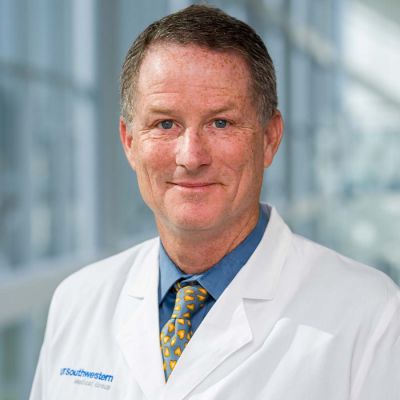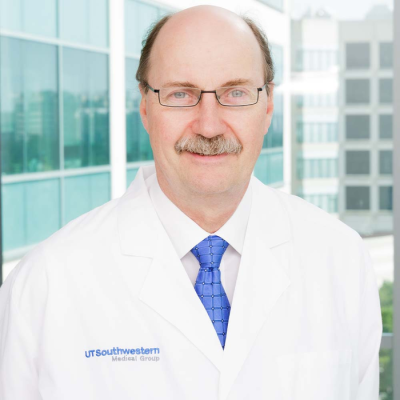
James de Lemos, M.D. Credit: UT Southwestern Medical Center
Mrach 8, 2022 – Diagnosing heart attacks after heart surgery remains difficult due to shortcomings of current diagnostic tools when applied to postoperative patients, including the electrocardiogram and blood tests to detect levels of cardiac troponins, according to an editorial in the New England Journal of Medicine (NEJM) written by two UT Southwestern faculty members.
A new study in NEJM details post-surgery attempts to identify abnormal levels of heart muscle proteins called troponins. But the article written by Cardiology Professor James de Lemos, M.D., and Michael Jessen, M.D., Professor and Chair of Cardiovascular and Thoracic Surgery, points out that the new tests lack clarity, and the use of many different assays to measure troponins makes clinical application of the findings problematic. They argue that more innovation is needed to determine how best to interpret troponin levels after heart surgery. To improve surgical outcomes, it will be necessary to sort out high troponin levels that are due to specific and modifiable complications of surgery from those due to the normal manipulation of the heart during the operation.
Drs. de Lemos and Jessen were invited to write the editorial because of Dr. de Lemos’ distinguished research into high-sensitivity troponins and Dr. Jessen’s national expertise in surgical techniques designed to improve safety and outcomes of heart surgery.
Dr. de Lemos helps lead UT Southwestern’s effort to incorporate high-sensitivity troponin assays to better diagnose heart attacks. In a multidisciplinary collaboration involving emergency medicine, lab medicine, cardiology, and hospitalist medicine, UTSW was among the first U.S. institutions to implement these tests. They have shown that implementing high-sensitivity troponin tests together with an accelerated diagnostic pathway enables clinicians to safely exclude heart attacks in an hour in most patients who arrive at the Emergency Department (ED) with chest pain. This shortens time spent in the hospital and reduces Emergency Department crowding.
Dr. de Lemos has published in JAMA about the prevalence of detectable levels of cardiac troponin T, a novel protocol for minimizing ED dwell times, and associations of high-sensitivity troponin with outcomes after intensive blood pressure lowering.
Under Dr. Jessen’s leadership, UT Southwestern achieves elite levels of patient care in cardiac surgery. According to data from the Society of Thoracic Surgeons Adult Cardiac Surgery Database, UTSW performed 269 aortic valve operations from July 2018 to June 2021 with a mortality rate of 0.74% – better than 94% of all heart surgery programs in the U.S. For surgeries to repair the mitral valve, UTSW results are better than 97% of all programs.
Dr. Jessen was part of the American College of Cardiology Foundation/American Heart Association Task Force that produced the 2011 Guideline for Coronary Artery Bypass Graft Surgery.
U.S. News and World Report ranks UT Southwestern as the No.1 hospital in Texas for cardiology and heart surgery and No.11 in the nation.
Dr. de Lemos holds the Sweetheart Ball-Kern Wildenthal, M.D., Ph.D. Distinguished Chair in Cardiology. Dr. Jessen holds the Frank M. Ryburn, Jr., Distinguished Chair in Cardiothoracic Surgery and Transplantation.
Conflict of interest disclosures are made in the manuscript.
For more information: https://www.nejm.org/



 February 03, 2026
February 03, 2026 









